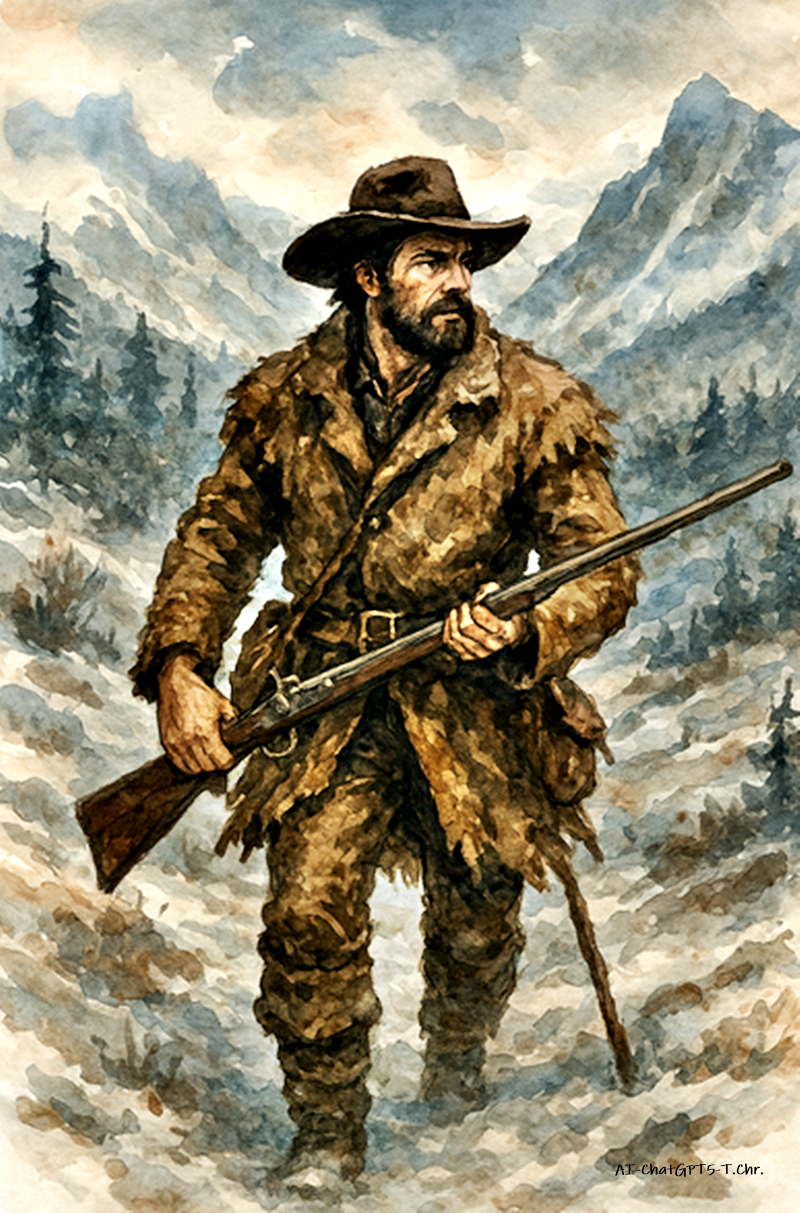Whispers of the Granite Peaks

AI-ChatGPT5-T.Chr.-Human Synthesis-23 September 2025
The year was 1854 when Elias Kane turned his back on the world he knew. A former sailor who had drifted into the Mexican-American War and left with more ghosts than victories, Elias longed for a silence he had never found on land or sea.
Word reached him of the high granite mountains beyond the Missouri frontier, where rivers cut through forests like silver knives, and the only law was that of survival. With nothing but a battered musket, a hatchet, and the will to vanish, Elias disappeared into the Rockies.
At first, the mountains mocked him. He could not trap a rabbit, nor keep a fire alive in the bitter night winds. His boots rotted, his belly emptied, and he came close to death more than once. It was Old Two Dogs, a reclusive Shoshone trapper, who found him half-frozen in a ravine. Two Dogs taught Elias the rhythms of the land—the way the elk moved with the seasons, the call of a raven that warned of wolves, the bark of aspen that kept the fever at bay.
As the years passed, Elias carved out a place for himself among the crags and timber. He built a cabin of pine logs by a hidden lake, learned to fish with bone hooks, and stitched his own clothes from deer hides. But the wilderness had a way of offering companionship when one least expected it. He stumbled upon a runaway woman named Clara—pale, scarred, and fleeing an abusive homestead in the lowlands. Though reluctant to share his solitude, Elias could not turn her away. Clara’s hands, skilled in tending wounds and preserving food, became as vital as his own axe and rifle.
Together they survived storms, wolves, and a winter that froze the very earth. Slowly, trust grew into something like love. But the mountains, jealous and unforgiving, rarely allowed happiness to last. A gold-hunting expedition stumbled through their valley, led by desperate men who tore through the land like locusts. Elias warned them to leave; they mocked him. When Clara was taken in the night, Elias’s blood ran colder than the snow.
The rescue that followed became the making—and the breaking—of him. Alone, Elias tracked the raiders through blizzards and cliff-shadows, using every skill Two Dogs had taught him. One by one, the men fell to traps set in silence, to arrows loosed in moonlight, to avalanches coaxed by dynamite stolen from their own packs. When he found Clara, she was half-dead but alive. The survivors whispered his name with fear as they fled: “The Ghost of Granite Peaks.”
But vengeance carries a price heavier than hunger. Clara, shaken by the blood that stained his hands, chose to leave the mountains when spring came, unable to live in the shadow of his fury. Elias remained, alone once more, his legend whispered by both settlers and tribes alike.
The Orphaned Ones
One autumn, as the aspens turned gold and the elk bugled across the ridges, Elias came across a smoke column twisting in the high air. Cautiously, he followed it and found a small wagon overturned near a creek, its wheels shattered, its oxen slain by arrows. The ground was littered with scattered goods, broken crockery, and a trail of blood leading into the pines.
He tracked it to a ravine where two terrified children crouched beneath a fallen tree, their mother lying still beside them. They had been bound for Oregon but ambushed by a rogue band of men masquerading as trappers. Elias knew leaving them meant certain death. Against his instincts, he took the children into his care, leading them back to his cabin.
For weeks, he guarded them. He taught the boy how to fish with a sharpened stick, and the girl how to gather roots without poisoning herself. At night, he told them stories of the sea, of storms that swallowed ships whole. But danger followed close. The raiders had seen Elias that day and wanted what he had—supplies, furs, and the rumor of silver ore hidden in the granite cliffs.
One bitter night, when the moon was no more than a pale scratch in the sky, the men came. They surrounded his cabin, their torches a ring of fire in the snow. Shots cracked through the trees. Elias doused his lamp and led the children into a crawlspace beneath the floorboards, pressing a finger to his lips. Then he slipped outside, vanishing into the dark.
The fight that followed was waged in silence. Elias struck like the wolves he had learned from—snapping traps on ankles, driving a knife from the shadows, loosing arrows he had carved from hawthorn. The raiders panicked, thinking spirits haunted the valley. By dawn, only two limped away, swearing never to set foot in the peaks again.
But the battle left Elias wounded, a bullet grazing his ribs, fever burning him through winter. He might have died had not Old Two Dogs returned. The Shoshone nursed him back with bitter teas and chants that seemed older than the mountains themselves. The children, wide-eyed and hardened by the ordeal, called Elias their father now.
Chains of the Crow
Spring brought no peace. The Crow, angered by the encroachment of gold-seekers and settlers, began raiding valleys, Elias once roamed freely. Once, while hunting elk, he stumbled into a war party. They bound him, left him staked in the sun as a warning to others. For two days, he lay beneath circling vultures, lips cracked, ants crawling across his face. Only a sudden storm saved him, washing away his bonds and scattering the guards. Elias crawled back to his cabin, more ghost than man, vowing never again to trespass lightly into sacred lands.
Yet danger always came knocking. Wolves prowled the edge of his home, testing the fence. A grizzly, starved from a lean season, tore through his food stores and nearly ended him in the snow. The children grew into hardy survivors, but the wilderness claimed innocence faster than it gave wisdom.
One night, as fire crackled low, the boy asked:
“Are we safe here, Pa?”
Elias stared into the flames, listening to the wind pressing against the logs. In his heart, he knew the truth. The mountains gave, and the mountains took. Safety was an illusion—one he could only fight for, never hold.
The Last Crossing
Late in his life, when streaks of gray threaded through his hair and his hands bore the stiff ache of cold winters, Elias faced one final trial.
It came in the thaw of spring, when the rivers swelled with snowmelt and roared like thunder through the valleys. The children, now hardened young adults, had set traps downstream. A storm had brewed, sudden and furious, snapping branches like twigs and sending walls of water down the gorge. Elias heard their cries above the river’s rage.
He rushed to the banks and saw them stranded on a boulder, the torrent rising fast. Without hesitation, he lashed a rope to a pine, tied it to his waist, and plunged into the icy flood. The current hammered him, dragging him under, smashing him against hidden stones. But he clawed forward, inch by inch, until he reached the children.
“Hold on!” he roared, voice swallowed by the river. With all his remaining strength, he bound them to the rope and signaled. The river tried to tear them away, but the pine held. One by one, the children scrambled back to shore.
Elias, though, lingered in the water too long. A log, carried swift as a spear, struck his shoulder and dragged him beneath. He fought, as he always had, not for glory but for survival. When at last he crawled onto the bank, battered and bleeding, he lay staring at the sky, the storm breaking into sunlight. He had saved them—but he knew the mountains had claimed another piece of him.
That night, a fever set in. His breaths grew shallow, his hands shook. The children kept vigil by his side, tears tracing the dirt on their faces. Elias managed a faint smile.
“You’ll do,” he whispered. “You’ll outlast me. That’s enough.”
As dawn touched the peaks with gold, Elias Kane drew his last breath. The children buried him by the hidden lake, beneath a cairn of stones. From then on, travelers spoke of a figure sometimes seen on the ridges, watching over the valley with a wolf at his side. Whether man, myth, or memory, no one knew.
A Wilderness Philosophy
Elias Kane’s story, passed from campfire to campfire, was never told as triumph. It was spoken in hushed tones, with respect and unease. He was not a conqueror of the wilderness, nor its victim. He was something in between—a man who bent his life around the sharp edges of an untamed world.
The wilderness had tested him with fire, frost, beast, and man alike. It had given him fleeting love, stolen it away, then forced him to build meaning from loss. In saving the children, in carving a life out of silence, he had proven not that man masters nature, but that man survives only by listening to it, fearing it, and accepting its merciless gifts.
Some said he found freedom there in the granite peaks. Others whispered he was cursed, bound to wander in solitude until death. Perhaps both were true.
For the wilderness itself is a mirror. To those who enter it seeking peace, it shows the cost of solitude. To those who enter it seeking power, it shows their weakness. And to those like Elias—broken men searching for a place beyond the reach of the world—it shows only the truth:
Survival is not triumph, but endurance, and that freedom is never without a price.
